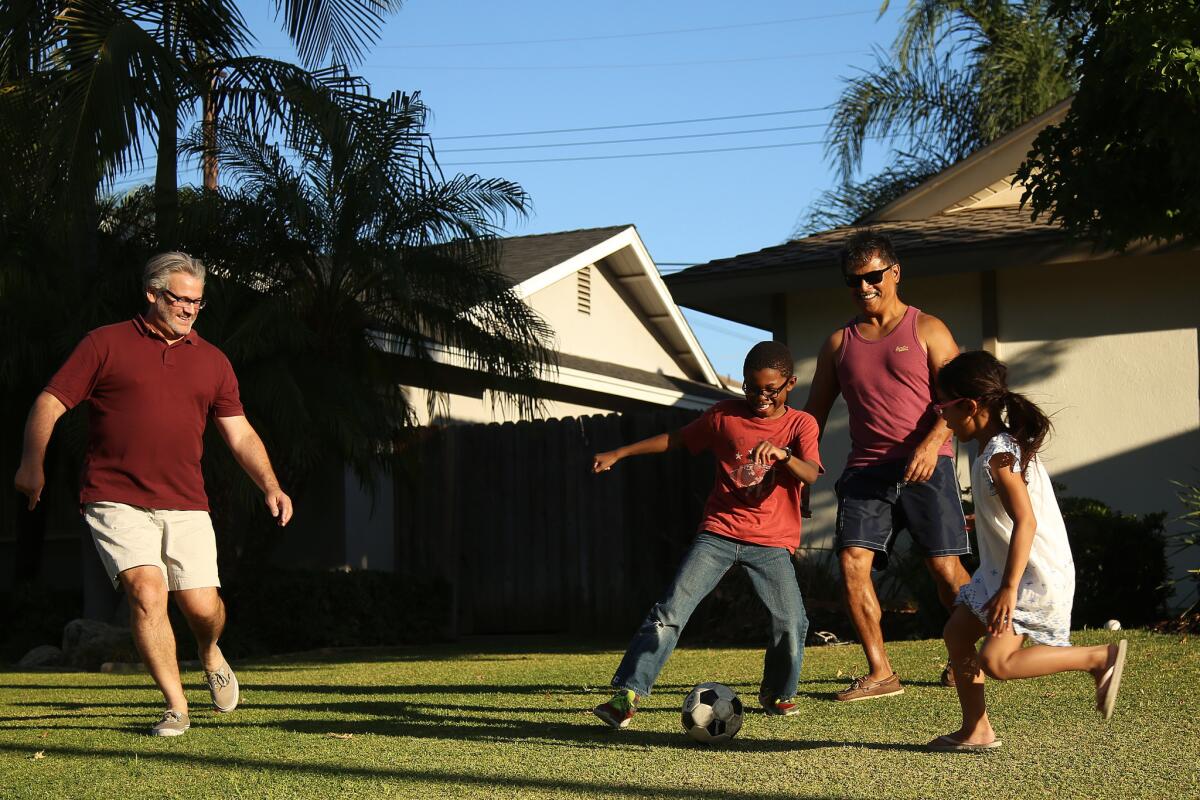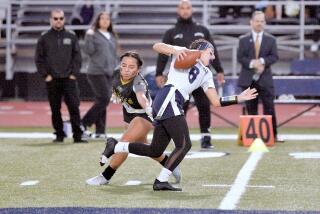Orange County family waits for federal ruling on same-sex marriage

Matthew Mansell, left, and John Espejo play soccer with their children Wyatt, 8, and Elyse, 7, right. The family recently returned to California after living in Tennessee, where they say they were not as accepted by the community.
- Share via
Reporting from PLACENTIA — Here in the suburbs, Matthew, John and their two children are just another nuclear family cozied up in front of the TV on a Saturday night.
Their single-story house sits on a quiet residential street in Placentia, a small slice of northern Orange County where some of the street signs are decorated with patriotic symbols and the motto is an inviting, “A pleasant place to live.”
Tonight is movie night — the family’s favorite shared Saturday activity. It’s 8-year-old Wyatt’s turn to pick, and he decides on “ParaNorman,” an animated comedy about a boy’s quest to end a curse on a town where a tribunal years before had declared a little girl a witch.
Three thousand miles to the east, Matthew Mansell and John “Johno” Espejo are facing a different panel of judges. They are among more than 30 plaintiffs in a potentially historic U.S. Supreme Court case that could finally establish national law on same-sex marriage, potentially as far-reaching as a ruling that states have a constitutional obligation to marry same-sex couples. A decision is expected this month.
Their case deals with one end of the constitutional question the high court is facing: Should the marriages of couples who’ve been legally wed in one state be recognized in a state where gay marriage is illegal? Mansell and Espejo were married in California but their union counted for little when they moved to Tennessee.
In their petition to the court, Mansell and Espejo said that in Tennessee, where they moved after a job transfer, they were denied “the protections, obligations, benefits, and security” the state guarantees to other married couples.
“They could have been great citizens here forever,” said Abby Rubenfeld, one of the couple’s attorneys. “And instead, at least in part — in big part, because of this whole marriage thing — they ended up leaving and moving back.”
Mansell, 53, and Espejo, 48, met in San Francisco in 1995. They had similar tastes in music. Both liked to swim. Three years later, they bought a house together.
In May 2008, the California Supreme Court legalized gay marriage, and during a lunch break that August, the couple got married at City Hall in San Francisco.
“I wanted to make a statement,” Mansell said. “There’s nothing wrong with getting married.”
They would be among an estimated 18,000 California couples to do so before voters that November made same-sex marriage illegal again. The U.S. Supreme Court later struck down the ballot measure, and gay marriage returned to California.
Legally married, Mansell and Espejo adopted two children and felt not the least bit conspicuous in liberal Northern California
There are all kinds of families in this world, they explained to the kids. Some children are raised by single moms, others by two moms. They would have two dads. They would use both last names: Espejo Mansell. Espejo would stay home to raise them.
Then, in May 2012, Mansell’s job as a conflict analyst for a law firm brought the couple to Franklin, Tenn., a graceful city not far from Nashville. But to Mansell and Espejo, it seemed hostile and they felt judged and misunderstood. And just by crossing state lines, they were no longer treated as a married couple.
They picked their battles: The family booed whenever they passed Chick-fil-A, whose president had denounced gay marriage. To show he wasn’t embarrassed, Mansell referred to Espejo as “my husband” in public.
When the offer came to join a federal gay-marriage case, they signed on almost immediately. They wanted to see change.
“I think it was important for him, for his family, to be recognized,” said family friend Snezana Nedic, who worked with Mansell in San Francisco and has stayed in touch with the couple. “He wasn’t really sure what his rights were in Tennessee, so it was this constant uncertainty.”
Mansell and Espejo thought the case might be resolved at the state level, but the U.S. 6th Circuit Court of Appeals decided in the state’s favor in November 2014. The next step was the federal Supreme Court.
Concerned that they had opened themselves up to ridicule, or worse, the couple returned late last year to California, where they believed they could walk into a restaurant with their children without feeling judged by other diners. Even in conservative Orange County, their problems would be reduced to those that any other family might face: quieting loud voices, correcting grammar and handling an abrupt explosion of tears. Their neighbors were kind, their children’s teachers supportive and nobody did a double-take when the family went to the grocery store.
Back at home, the animated comedy film seems to strike an oddly familiar note.
Norman, the protagonist, sees spirits of the dead that no one else can see. He is bullied and shunned; he has only one friend. Yet he succeeds in lifting the curse.
“They’re all judges,” Mansell tells his children as the town elders emerge from their graves, nothing more than zombies now.
Espejo can’t help himself.
“Scalia,” he jokes as a zombie with a rumpled shirt and yellow eyes comes into view, alluding to Justice Antonin Scalia, who is expected to vote against same-sex marriage.
When the movie ends, the kids are told to rush off and brush their teeth, just part of the Saturday routine.
More to Read
Get the Latinx Files newsletter
Stories that capture the multitudes within the American Latinx community.
You may occasionally receive promotional content from the Los Angeles Times.






